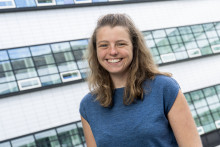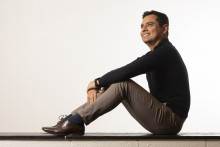Femke Witmans
PhD research topic: Higher order topological nano devices (HOTNANO)
Work: PhD candidate in the departments Nano Electronics (Faculty of Electrical Engineering, Mathematics and Computer Science) and Interfaces and Correlated Electron Systems / Quantum Transport in Matter (Faculty of Science and Technology), University of Twente
Education: Master’s degree in Material Physics at the University of Twente
Originally from: Arnhem, the Netherlands
‘I’ve always been curious about how things work. I was really drawn to fundamental research because it involves so many questions that are hard to answer. That motivates me to break those questions down. Even though once you do that, many more questions appear. It’s like an explosion – and it’s what motivates me.
For a long time, I wasn’t sure if I wanted to do a PhD. I decided to do an internship at a Dutch company to see if I liked working in the industry. The experience made me realize that I wanted to learn more about fundamental research before I decided where to work. Research interested me too much to just let it go, and so I started searching for PhD positions until I found the one that spoke to me.
My doctoral research focuses on nanowires, very small nanostructures that are about a thousand times smaller than a human hair. On such a small scale, physics works differently, and quantum mechanics apply. Nanowires could serve as building blocks for quantum computers, but they are rather new structures, and multiple research groups over the world are still characterizing them. I’m working with one specific type, which is a topological insulator and conducts differently than other materials. It could help us find Majorana bound states, which could be used in a fault-tolerant quantum computer.
‘My research is very applied and fundamental at the same time’
Although my work will probably never be directly used in a quantum computer, the knowledge will help us get further towards a quantum computer, which in turn can help us solve very difficult problems that have no solutions at the moment. In a way, my research is therefore very applied and fundamental at the same time. It’s important to me that it’s not too theoretical and abstract, that I’m still in touch with a material and work towards a goal. I want to be able to explain to others why they should care about my work.’
‘I decided to apply to be one of the Faces of Science of KNAW (The Royal Netherlands Academy of Arts and Sciences), although I was hesitant for a long time. Ultimately, it is important to me that society knows why my research matters. Physics research can be hard to explain because most people aren’t familiar with it, while other topics – like medical research, for example – are easier to understand. I was motivated to express that. The target group of the network are students in the last years of high school, and I’d like to inspire more people to pursue physics. On top of that, I noticed that almost none of the previous Faces of Science were from the University of Twente. I wanted to show that the UT is also the place to be. It is a top tier university with a lot of good research.’
(Text continues after the picture)

Faces of Science
Faces of Science is a network of PhD candidates from all over the Netherlands. As Faces of Science, the doctoral researchers mainly focus on science communication through blogs, videos, articles, lectures, and media appearances. They write and talk about their research, but also about what the life of a young scientist entails.
Faces of Science is an initiative of the KNAW (The Royal Netherlands Academy of Arts and Sciences), De Jonge Akademie (The Young Academy) and NEMO Kennislink. Since its inception in 2013, 114 PhD students have been selected as Faces of Science – four of them from the University of Twente: Clara Stegenhuis, Lieke Lokin, Koen de Koning and Femke Witmans.
‘I want to show people what PhD life is really like. The fun parts and the hard parts. Because it doesn’t always go smoothly. The most fun part for me is the team spirit. I had a mentor during my master’s, and we had a lot of talks about the difference between doing a PhD and working in industry. She told me that PhD was a lot more individual than working in a company, but that is not necessarily what I have experienced so far. I have a great team that I discuss everything with, and I love that we are working on something together. People are genuinely interested in what I do and think along.
Another great thing about doing a PhD is that you learn something new every day – which can also be the hard part, though. Because it means that every day there is something you don’t know. It can feel like everyone else knows what they are doing, except for you. That can be a bit demotivating, but it’s something you have to get through. I had a period when I felt demotivated but luckily I have good connections with many of my fellow PhDs and they helped me to get through it. Now I’m feeling inspired again and want to keep pushing until the end.’
‘I’m just starting the third year of my PhD journey and I don’t know what will come after. Industry and academia both have their own pros and cons. The main difference I’ve experienced is that industry is faster than academia. You tend to work on projects that will be applied in a couple of years, while academic research takes a lot more time. I’m enjoying academia right now because of the questions you receive from people around you. They can push you outside of the box and give you new inspiration on how to approach a problem. In a company, most knowledge is kept in-house because of competition with other companies. Academia is very open. Knowledge is shared because all scientists want to move forward. It’s a very collaborative environment.'
‘All scientists want to move forward’
The advice I’d give to fellow PhDs and prospective PhDs is: Go with the flow. At the beginning, I thought I’d be able to plan everything and that the research would go faster. However, sometimes you’ll find something very interesting along the way and decide to deep dive into it. This will eventually lead to good results that you are proud of, but you can’t predict if and when that will happen. It would be great if I could say this to Femke of two years ago.’








